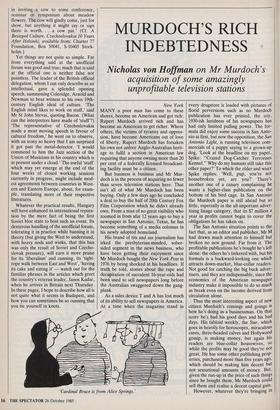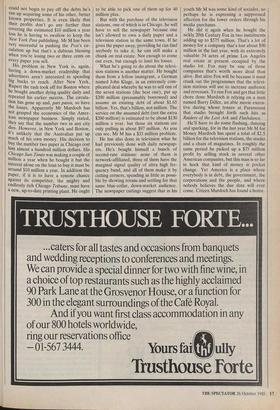MURDOCH'S RICH INDEBTEDNESS
Nicholas von Hoffman on Mr Murdoch's
acquisition of some amazingly unprofitable television stations
New York MANY a poor man has come to these shores, become an American and got rich: Rupert Murdoch arrived rich and has become an American to get richer. Where others, the victims of tyranny and oppres- sion, have become Americans out of love of liberty, Rupert Murdoch has forsaken his own not unfree Anglo-Australian herit- age to fulfil a section in American law requiring that anyone owning more than 20 per cent of a federally licensed broadcast- ing facility must be a citizen.
But business is business and Mr Mur- doch is in the process of acquiring no fewer than seven television stations here. That isn't all of what Mr Murdoch has been buying. Only a few days ago he concluded a deal to buy the half of 20th Century Fox Film Corporation which he didn't already own. From a man of no great visibility who zoomed in from afar 12 years ago to buy a newspaper in San Antonio, Texas, he has become something of a media colossus in his newly adopted homeland.
His brand of tits and ass journalism has irked the presbyterian-minded, sober- sided segment in the news business, who have been getting their enjoyment since Mr Murdoch bought the New York Post in 1976 by being shocked at his headlines. If truth be told, stories about the rape and decapitation of succulent 16-year-olds had been used to sell newspapers long before the Australian swaggered down the gang- plank.
As a sales device T and A has lost much of its ability to sell newspapers in America. At a time when the magazine stand in every drugstore is loaded with pictures of florid perversions such as no Murdoch publication has ever printed, the coy, 1930-ish luridness of his newspapers has had only limited pulling power. The for- mula did enjoy some success in San Anto- nio at first, but now the opposition, the San Antonio Light, is running television com- mercials of a puppy saying to a grown-up dog, 'Look at the headline on my paper, Spike: "Crazed Dog-Catcher Terrorises Kennel." Why do my humans still take this other paper?' To which the older and wiser Spike replies: 'Well, pup, you're not housebroken yet, are you?' There's another one of a canary complaining he wants a higher-class publication on the bottom of his bird cage. In San Antonio the Murdoch paper is still ahead but so little, especially in the all-important adver- tising linage category, that its $7 million a year in profits cannot begin to cover the obligations he has taken on.
The San Antonio situation points to the fact that, as an editor and publisher, Mr M had drawn much attention to himself but broken no new ground. Far from it. The profitable publications he's bought he's left alone: the others he's tinkered with, but his formula is a backward-looking one which attracts down-market, blue-collar readers. Not good for catching the big buck adver- tisers, and they are indispensable, since the economics of the American newspaper industry make it impossible to do so much as break even on the income derived from circulation alone.
Thus the most interesting aspect of new citizen Murdoch's comings and goings is how he's doing as a businessman. On that score he's had his good days and his bad days. His tabloid weekly, the Star, which goes in heavily for horoscopes, miraculous cures, three-headed calves and Hollywood gossip, is making money, but again his readers are blue-collar housewives, so while the profits may be good they're not great. He has some other publishing prop- erties, purchased more than five years ago, which should be making him decent but not sensational amounts of money. But, given the run-up in the price of such things since he bought them, Mr Murdoch could sell them and realise a decent capital gain.
However, whatever they're bringing 10 could not begin to pay off the debts he's run up acquiring some of his other, better known properties. It is even likely that their profits don't go any further than covering the estimated $10 million a year loss he is having to swallow to keep the New York Post publishing. Mr M has been very successful in pushing the Post's cir- culation up but that's a dubious blessing when you're losing two or three cents on every paper you sell. His problem in New York is, again, having a down-market readership that advertisers aren't interested in spending big bucks to reach. After New York, Rupert the rash took off for Boston where he bought another dying quality daily and repeated his earlier success. The circula- tion has gone up and, pari passu, so have the losses. Apparently Mr Murdoch has not grasped the economics of the Amer- ican newspaper business. Simply stated, they say that the number two in any city dies. However, in New York and Boston, it's unlikely that the Australian put up • much of his own money. His decision to buy the number two paper in Chicago cost him almost a hundred million dollars. His Chicago Sun-Times was making a couple of million a year when he bought it but the interest alone on the loan to buy it must be around $10 million a year. In addition the paper, if it is to have a remote chance against its competitor, the mighty and endlessly rich Chicago Tribune, must have a new, up-to-date printing plant. He ought
to be able to pick one of them up for 40 million plus.
But with the purchase of the television stations, one of which is in Chicago, he will have to sell the newspaper because one isn't allowed to own a daily paper and a television station in the same town. If he gives the paper away, providing he can find anybody to take it, he can still make a chunk on real estate. Not enough to come out even, but enough to limit his losses.
What he's going to do about the televi- sion stations is another matter. He bought them from a fellow immigrant, a German named John Kluge, in an extremely com- plicated deal whereby he was to sell one of the seven stations (the best one), put up $200 million (presumably borrowed) and assume an existing debt of about $1.65 billion. Yes, that's billion, not million. The service on the assumed debt (not the extra $200 million) is estimated to be about $130 million a year, but those six stations are only pulling in about $97 million. As you can see, Mr M has a $33 million problem.
He has also done in television what he had previously done with daily newspap- ers. He's bought himself a bunch of second-rate stations: none of them is network-affiliated, three of them have the marginal signal quality of ultra high fre- quency band, and all of them make it by cutting corners, spending as little as possi- ble by showing reruns and settling for that same blue-collar, down-market audience. The newspaper cuttings suggest that in his youth Mr M was some kind of socialist, so perhaps he is expressing a suppressed affection for the lower orders through his media purchases.
He did it again when he bought the sickly 20th Century Fox in two instalments adding up to $575 million. That's a lot of money for a company that's lost about $90 million in the last year, with its extremely valuable 54 acres of prime Los Angeles real estate at present occupied by the studio lot. Fox may be one of those companies that's worth more dead than alive. But alive Fox will be because it must crank out the programmes that the televi- sion stations will use to increase audience and revenues. To run Fox and get that little chore done Murdoch is relying on a man named Barry Diller, an able movie execu- tive during whose tenure at Paramount that studio brought forth such hits as Raiders of the Lost Ark and Flashdance.
He'll have to do some flashing, dancing and sparking, for in the last year Mr M for Money Murdoch has spent a total of $2.5 billion for the television stations, the studio and a chain of magazines. In roughly the same period he picked up a $75 million profit by selling stock in several other American companies, but this man is so far in hock that kind of money is pocket change. Yet America is a place where everybody is in debt, the government, the corporations and the people, and where nobody believes the due date will ever come. Citizen Murdoch has found a home.



























































 Previous page
Previous page